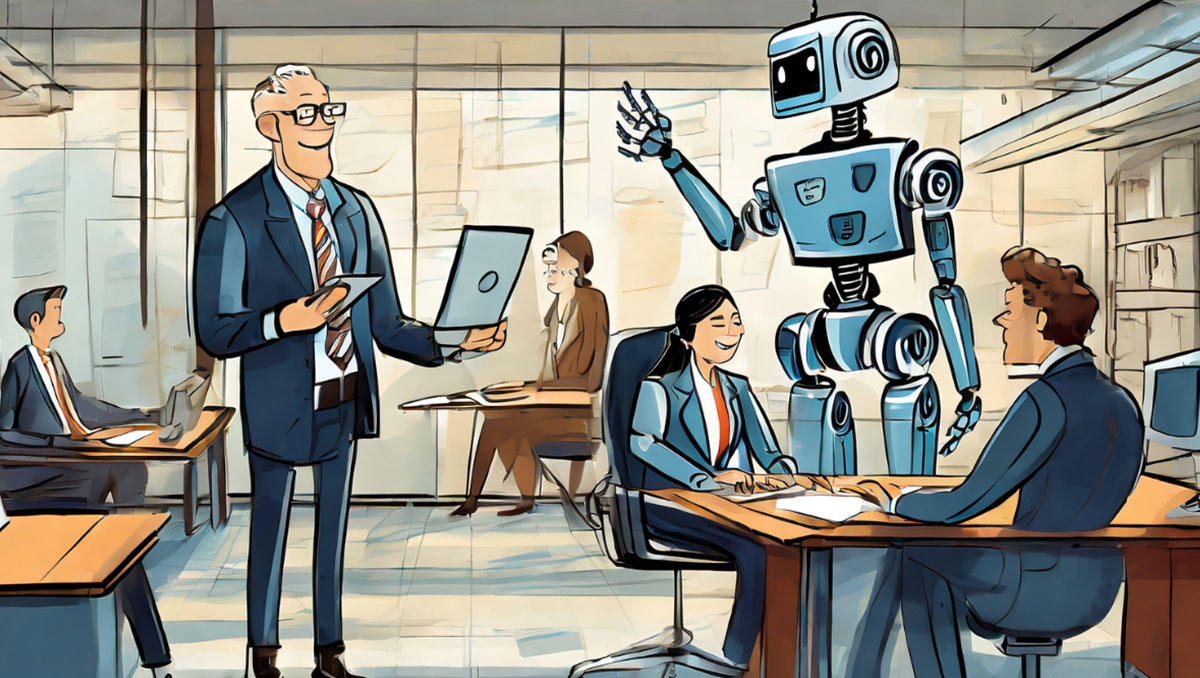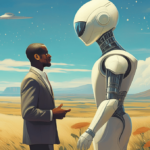The role of Artificial Intelligence (AI) is becoming increasingly significant. As it continues to evolve, it reshapes industries and redefines the nature of work. The September-October 2023 issue of Harvard Business Review (HBR) addresses this trend in an article from Raffaella Sadun et al titled “Reskilling in the Age of AI” (page 56).
This article suggests there are new paradigms for leaders and employees to adapt to the AI-driven world. Its an excellent piece of work and well worth your time to read. Here are the key takeaways from the article and exploration of how businesses can prepare for the future.
The New Paradigms
AI as a Collaborator
A collaborator rather than just a tool. AI systems are no longer confined to performing repetitive tasks; they are now capable of augmenting human decision-making and creativity. This shift is a change in how employees interact with technology. It’s not just about command and control anymore; it’s about collaboration and synergy.
Continuous Learning
Focuses on the importance of continuous learning. With AI technologies evolving at a fast pace, employees can’t afford to rest on their laurels. Lifelong learning becomes a necessity, not a luxury. Organisations need to invest in ongoing training programs and create an environment that encourages curiosity and exploration.
Skill Versatility
In an AI-driven world, having a diverse skill set is more crucial than ever. Employees need to be proficient in technical skills, such as data analytics and machine learning, while also excelling in soft skills like communication, emotional intelligence, and problem-solving.
Data-Driven Decision-Making
AI provides data that can offer valuable insights into consumer behaviour, market trends, and operational efficiencies. Leaders must be adept at interpreting this data to make informed decisions. This requires a new kind of literacy—one that blends technical understanding with business acumen.
Ethical Considerations
As AI systems become more integrated into business operations, issues like data privacy, algorithmic bias, and ethical use of technology come to the forefront. Organisations need to develop ethical guidelines and ensure that they are adhered to in all AI-related activities.
Relevance to Businesses
For businesses, especially those involved in consultancy, these paradigms serve as a roadmap for navigating the AI landscape. Implementing AI solutions is not just about adopting new technologies; it’s about preparing your human capital to work synergistically with these systems. This involves not only reskilling but also fostering a culture of continuous learning and ethical responsibility.
The Role of Leadership
Leadership is a pivotal and indispensable element in the transition to an AI-driven work environment. The challenges are multifaceted, ranging from technological adaptation to cultural transformation, and leaders are the linchpins who can bring it all together.
Technological Proficiency
It’s imperative for leaders to have a foundational understanding of AI and data analytics. This doesn’t mean they need to be experts in coding or machine learning algorithms, but they should be capable of understanding the implications, limitations, and possibilities that these technologies bring. A leader who understands the technology can make informed decisions, allocate resources more effectively, and set realistic goals for the organisation.
Human-Centric Approach
Leaders must not lose sight of the human element. As machines become smarter, the value of human skills like creativity, emotional intelligence, and complex problem-solving becomes even more critical. Leaders should focus on helping employees adapt to new technologies by providing training programs, mentorship, and opportunities for skill development.
Ethical Stewardship
Ethical considerations are paramount. As AI systems become more integrated into business operations, leaders must ensure that ethical guidelines are not just in place but are actively followed. This involves regular audits, transparent communication, and a commitment to rectify any ethical lapses promptly.
Facilitative Leadership
The role of a leader is evolving from a directive approach to a more facilitative one. Leaders should act as enablers, providing the necessary resources—be it time, money, or manpower—and creating an environment where employees feel empowered to learn, innovate, and grow. They should encourage a culture of continuous learning and be open to feedback, fostering a two-way dialogue that benefits both the organisation and its employees.
Final Thoughts
“Reskilling in the Age of AI” serves as a comprehensive guide for anyone looking to understand the future of work in an AI-driven world. It provides actionable insights that are crucial for both employees and leaders. As AI continues to reshape industries, the paradigms outlined in this article offer a solid foundation for adapting to these changes. Businesses that proactively engage with these paradigms will not only survive but thrive in the age of AI. The lessons presented here are applicable to everyone who works as knowledge workers.
Questions for you to Ponder
How prepared is your organisation for the integration of AI into its operations?
What steps have you taken to foster a culture of continuous learning?
Are ethical considerations a part of your AI strategy?
By understanding and implementing the paradigms discussed in the HBR article, businesses can position themselves for success in the age of AI.
The future belongs to those who are prepared, and this article provides the blueprint for that preparation.











Leave a Reply